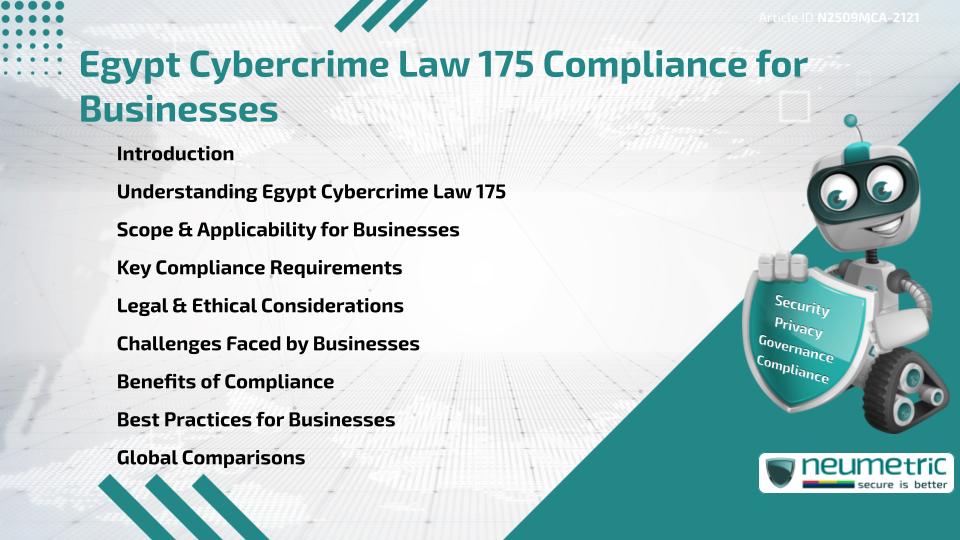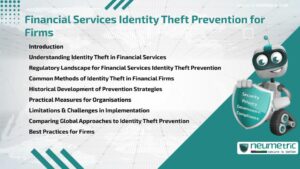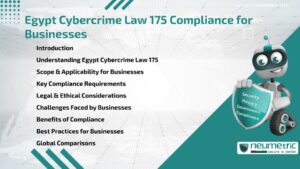Table of Contents
ToggleIntroduction
Egypt cybercrime law 175 compliance is a critical requirement for businesses operating in Egypt. The law, formally known as Law No. 175 of 2018 on Combating Information Technology Crimes, establishes legal frameworks to regulate internet usage, data handling & online activities. For businesses, this law defines obligations regarding Data Security, lawful monitoring & cooperation with authorities. Failing to comply can result in severe penalties, including fines & imprisonment. This article explains the scope, Compliance Requirements, challenges & Best Practices related to Egypt cybercrime law 175 compliance, ensuring businesses understand their responsibilities under this important regulation.
Understanding Egypt Cybercrime Law 175
Egypt introduced Law 175 in 2018 to address growing concerns around cybercrime. It criminalises unauthorised access, hacking, data breaches & online content deemed harmful to national security or public order. The law also mandates internet service providers & businesses to retain User Data for at least one (1) hundred eighty (180) days & provide it to authorities upon request.
By doing so, the law aligns Egypt with global practices in Cybersecurity regulation. Similar to the United States’ Computer Fraud & Abuse Act & the European Union’s General Data Protection Regulation [GDPR], the Egyptian Framework prioritises state security while imposing strict obligations on businesses.
Scope & Applicability for Businesses
Egypt cybercrime law 175 compliance applies broadly to Organisations operating in Egypt or offering services through Egyptian networks. This includes:
- Internet service providers
- E-commerce platforms
- Financial institutions
- Technology companies
- Any entity storing or processing User Data
Even Small Businesses are not exempt if they collect or manage Personal Data. Thus, understanding the scope of the law is essential for all Organisations engaging in digital operations within Egypt.
Key Compliance Requirements
Businesses must meet specific obligations under the law, including:
- Retaining User Data such as IP addresses, browsing history & communication metadata for six (6) months
- Implementing Security Measures to prevent unauthorised access
- Reporting cyber incidents to authorities
- Providing access to retained data when required by law enforcement
- Ensuring lawful use of surveillance tools
These requirements create a compliance environment that balances User Privacy with Government oversight.
Legal & Ethical Considerations
Critics argue that while the law strengthens Cybersecurity, it may also compromise Privacy & freedom of expression. Human rights advocates caution that broad Government access to data could result in overreach. From a business perspective, ethical challenges emerge when balancing regulatory obligations against consumer trust. Transparency, clear Privacy Policies & responsible handling of User Data can help mitigate concerns.
Challenges Faced by Businesses
Businesses face several hurdles in achieving Egypt cybercrime law 175 compliance:
- High costs of implementing monitoring & storage systems
- Technical complexity of maintaining secure infrastructure
- Lack of awareness or training among Employees
- Potential reputational Risks if compliance is perceived as compromising Privacy
These challenges require careful planning, investment & clear communication with Stakeholders.
Benefits of Compliance
Despite challenges, compliance offers important advantages:
- Legal protection from fines & sanctions
- Enhanced Customer Trust through transparent practices
- Improved Cybersecurity resilience
- Strengthened reputation as a responsible Organisation
Businesses that proactively comply demonstrate a commitment to both Regulation & User protection.
Best Practices for Businesses
Organisations can adopt several strategies to ensure compliance:
- Develop clear internal Policies for data handling
- Train Employees on Cybersecurity awareness
- Use encryption & secure storage technologies
- Regularly Audit systems for Vulnerabilities
- Engage legal counsel to review compliance measures
By treating compliance as an ongoing process rather than a one-time requirement, businesses can manage Risks more effectively.
Global Comparisons
Egypt’s approach to cybercrime is more state-centric than frameworks like GDPR, which emphasize User rights. However, it shares similarities with other national security-focused laws in the Middle East. Understanding these global differences helps multinational companies align their strategies & maintain consistency across regions.
Takeaways
- Egypt cybercrime law 175 compliance applies to all businesses handling User Data in Egypt
- Obligations include data retention, incident reporting & cooperation with authorities
- Ethical considerations around Privacy & freedom of expression remain significant
- Compliance brings both challenges & benefits, requiring continuous adaptation
- Best Practices include training, audits, encryption & legal review
FAQ
What is Egypt Cybercrime Law 175?
It is a law passed in 2018 to regulate online activities, criminalise cyber offenses & mandate Compliance Requirements for businesses.
Who must comply with Egypt Cybercrime Law 175?
All businesses operating in Egypt or processing data through Egyptian networks must comply, including small & medium enterprises.
What data must businesses retain under the law?
Businesses must keep IP addresses, browsing activity, communication records & metadata for one (1) hundred eighty (180) days.
What are the penalties for non-compliance?
Penalties include heavy fines & potential imprisonment for responsible individuals within the business.
How does this law affect Customer Privacy?
The law gives authorities significant access to User Data, which raises Privacy concerns. Businesses must balance compliance with transparent Privacy practices.
How can businesses prepare for compliance?
By implementing secure infrastructure, training staff, auditing systems & seeking legal advice.
Is Egypt’s law similar to GDPR?
No, GDPR focuses on protecting individual rights, while Egypt’s law prioritises national security & Government access to data.
Do international companies also need to comply?
Yes, if they provide services within Egypt or use Egyptian networks, they must meet compliance obligations.
Need help for Security, Privacy, Governance & VAPT?
Neumetric provides organisations the necessary help to achieve their Cybersecurity, Compliance, Governance, Privacy, Certifications & Pentesting needs.
Organisations & Businesses, specifically those which provide SaaS & AI Solutions in the Fintech, BFSI & other regulated sectors, usually need a Cybersecurity Partner for meeting & maintaining the ongoing Security & Privacy needs & requirements of their Enterprise Clients & Privacy conscious Customers.
SOC 2, ISO 27001, ISO 42001, NIST, HIPAA, HECVAT, EU GDPR are some of the Frameworks that are served by Fusion – a SaaS, multimodular, multitenant, centralised, automated, Cybersecurity & Compliance Management system.
Neumetric also provides Expert Services for technical security which covers VAPT for Web Applications, APIs, iOS & Android Mobile Apps, Security Testing for AWS & other Cloud Environments & Cloud Infrastructure & other similar scopes.
Reach out to us by Email or filling out the Contact Form…





